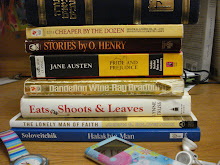This morning, as I was washing my face, one of my contacts fell out.
I have contacts that are meant to be worn a month at a time, without being taken out, even to sleep. This means that I close my eyes at night with the ability to see, and I open them in the morning with the same capacity. It also means that I sometimes forget that I am extremely myopic, in the most literal sense. Without contacts or glasses, anything that is further than four inches away from my eyes appears blurry; things that are mere feet away look like nothing but colorful blobs.
I am supposed to change my contacts every month, and to give my eyes a break by wearing my glasses for a day in between. I hate my glasses. Not only because I think they look awful on me, but because they fall down my nose at the slightest provocation and allow me no peripheral vision. When my contact fell out this morning, I figured it had been about a month since I changed them, so I removed the other one and dutifully put on my glasses, intending to put in a new pair of contacts before shabbos started. I soon found that the glasses were almost more trouble than they were worth—getting caught on my hair and making themselves generally obnoxious. So I took them off, and tried to function.
It was then that it hit me: I have a serious handicap. I can’t do anything, really, without visual correction.
I realized that if I lived in another era, I would be practically incapacitated. Not only that, but I would miss out on so much of what brings me joy in life: a breathtaking mountain view or sunset, a thoughtful and entertaining dramatic production, watching the interesting people on the subway—even my friends’ faces would be lost to me unless inches from my own. Learning would be a lot more difficult too, and seeing the board in class—forget it.
Yet here I am, with the luxury of forgetting that I even have this disability, thanks to the wonders of modern science and technology. In a societal climate of complaint and general dissatisfaction, I can only feel incredibly grateful to God for the opportunities afforded me, not the least of which is the chance to live a normal life, independent and fully-sighted.
And in case you haven’t guessed, I put my glasses back on.

7 comments:
Interesting post. That's very tought-provoking.
If it's any comfort to you (although I know that this kind of undoes your meaningful point), it might be worth wondering whether your eyes would never have worsened to the point that they're at now had you not worn visual corrections every day since your youth.
Oh Jackie....always the practical one! But SJ, as someone in a similar predicament, I wonder how I can say the bracha of pokeiach ivrim with as little kavanah as I usually do.
J - I don't know anything about the science involved...but I do know that my vision actually improved over the last couple of years (my prescription went down slightly). Don't ask me how that happened. Even if my eyesight was a bit better than it is, it would still be a major handicap....so I'm going to hold on to my point, k? :)
deal!
And I, also myopic, wear contacts that I must insert daily...and after I put them in, I actually SAY, with heartfelt gratitude the brucha "pokayach ivrim," right then. In a sense, I'm grateful NOT to be able to wake up to a clear world, because inserting those lenses reminds me how dependent I am on Hashem's will all the time. (On the other hand, I'm sloppy about other mizvot; they just don't "stare me in the face" like this one).
We all sometimes need help to see clearly. :)
Hmmm... There I was, ready to post "G-d bless peripheral vision!" yet I hadn't even thought of "pokeach ivrim." Thanks for the kavanah shot, friendilach!
Post a Comment